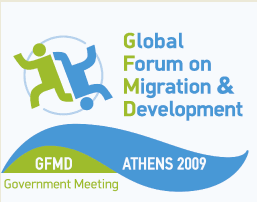
On 4 November, UNITAR, representing the
Global Migration Group (GMG), the inter-agency group of 12 UN agencies, the
IOM and
World Bank, shared its vision for how the UN and its partners can support migrants and governments in the face of the current economic crisis.
Dr. Carlos Lopes, Executive Director of UNITAR and current Chair of the GMG, addressed Ministers and heads of delegation at the
third Global Forum on Migration and Development (GFMDIII) in Athens on 4 November. He emphasized the GMG's willingness to support governments in ensuring that development gains stay on track; that migrants’ rights are protected; and that data be made more readily available on this growing phenomenon. (See
Joint Statement of the Global Migration Group)
In the GMG press conference also on 4 November in Athens presided by Dr. Lopes, emphasis was placed on the protection of migrants’ rights and on the benefits of market regulation. Agence France Presse pointed out the fact that a rally was to take place outside the conference hall by migrants who considered their interests are not being represented. Dr. Lopes stressed the centrality of human rights protection to the UN agenda. Mr. Bacre Ndiaye, UNHCHR, concurred: “if people are working in a given country, it is because they are needed…. If they are needed, they must be protected…Countries must ask themselves: what is our value system? If it is one that upholds democracy, human rights, it must uphold the rights of all human beings”. Mr. the Director-General of IOM, Mr. William Lacy Swing stressed that public information and education are instrumental to enhancing the protection of migrants. Ms. Jeni Klugman, in presenting the
UNDP Human Development Report (2009) entitled “Overcoming barriers: Human mobility and development”, added: “Generally speaking, ensuring the integration of migrants helps to secure their rights”. On questions pertaining to the benefits of countries’ regulating their labour markets, Dr. Lopes stressed; “unregulated markets create a mess; there are important incentives to get this right”. Ms. Klugman concurred: “lack of regulation has social costs…: a relatively large presence of migrants in an irregular situation can undermine… the rule of law”.
ILO provided country-specific examples of the benefits of regularizing the labour force. Ms. Hania Zlotnik of
UNDESA was hopeful that the processes was resulting from the UN General Assembly's High-level Dialogue (2006) such as the Global Forum, are contributing to making migrants’ voices heard.
To see the press release click
here.
To see the Joint Statement of the Global Migration Group click here.


